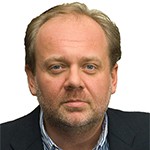by Nicholas Watt

On April 7, Boris Jordan, CEO of Sputnik Group, gave a presentation to European University’s students and professors in the Golden Hall. After being introduced by Rector Kharkhordin, Jordan began with the warning that he may from time to time switch back into Russian. Indeed, Jordan, a US citizen, has spent the last twenty years living and working in Russia.
After graduating from New York University, where both of his parents attended, Jordan moved to Moscow and got a job at Credit Suisse First Boston. Originally Jordan wanted to be a US diplomat, but when he realized that he would not be placed in Russia, he went into finance. He set up Renaissance Capital with Vladimir Potanin and soon after that, Sputnik. In the early 2000s, Jordan served as chief of Gazprom-Media’s NTV until 2003, when he was relieved for political reasons. Jordan is also a member of the Council of Foreign Relations.
Jordan’s talk, entitled “The Ukrainian Crisis and Why the Russian Economy is Slowing,” covered three main topics: first, how the Russian economy got to where it is now, second, what the present challenges are, and third, what can be done going forward.
The expansion of the Russian economy in the early 2000s was, according to Jordan, due to the following factors. First, Putin instituted a tax system based on profit, not revenue; taxing revenue had caused many Russian businesses to evade taxes just to stay afloat. Second, private owners had more confidence that their assets would not be renationalized and made minor investments which yielded major profits. Third, there was consumer led growth that came as a result of the increased wealth from rising oil prices.
This growth led to what is known as “Dutch Disease” – as the ruble got stronger, other sectors of the Russian economy, especially manufacturing, became uncompetitive and suffered.
This growth led to what is known as the “Dutch Disease” – as the ruble got stronger, other sectors of the Russian economy, especially manufacturing, became uncompetitive and suffered. Additionally, in the early 2000s about 80% of the GDP was privatized, but since then much has been nationalized. To Jordan, this means lower productivity. And the country’s “twisted financial policy” played a role in it experiencing the biggest contraction in GDP during the economic crisis of 2008.
One of the present challenges that Jordan pointed out is that Russia’s capacity has been used up – the easy money that came with minimal investment has already been made. Russia needs more capital and fundamental investment. Though foreign investment is relatively healthy, notwithstanding the damage already done by the Ukrainian crisis, domestic investment is seriously lacking, Jordan claimed, using Mikhail Friedman as an example. Friedman, one of Russia’s richest men, sold his share of Russia’s TNK and bought a German oil company.
“We have come to a crossroads. We have used up all existing capacity. Now, it is about hard work and reforms. First and foremost, we need to build confidence. Build domestic capital; the real money is FID, but it’s not enough. We have to invest in housing stock. Have to invest in education and healthcare.”
“The irony is if you look at Ford, GE, Procter and Gamble, they have made more money per dollar invested in Russia than in any other emerging market in the world.” Jordan continued to explain that the problem is that these companies’ boards do not let them invest in Russia because of the perceived risk the country presents. “Events [in Ukraine] have heightened the lack of confidence that could have a bigger effect than macroeconomic issues.” According to Jordan, this confidence problem stems from a lack of a transparency in decision-making, an inadequate rule of law, and low asset security; he highlighted the case of the expropriation of Yukos in 2003. “How can you plan to go forward?” Jordan left for the audience to ponder.
Jordan cited seven areas that needed to be addressed in the Russian economy: Corruption, diversification from oil and gas and rebalancing from state dominance, creation of efficient capital market, tax reform, efficient infrastructure investments, housing improvement and labor mobility, education and public health.
Jordan then went on to explain some of these in more detail, starting with the overdependence on fossil fuel revenue. “I can’t stress enough how much Russia needs to get away from resource economy. Russia should invest in and be a leader in it; it would be foolish if it didn’t. But we also need to diversify because when we see a drop in oil prices, which is likely – partially because of US production – it will be a huge problem.” Jordan estimated that the Brent price of oil could drop down to $75 per barrel by the end of the year. The Russian budget is balanced on a $115 per barrel price, he noted.
Jordan moved to another problem: the puny sum of domestic savings in Russia. For comparison, Brazil – whose economy is similar to Russia’s in a lot of ways – has about $1.1 trillion in domestic savings, whereas Russia has only $134 billion. This translates to a poor national pension fund. Jordan’s company had built the 8th largest pension fund in Russia, but then sold it in 2012 right before Russia’s pension reform, which Jordan views as a negative development. He added that the Russian government – via bureaucratic measures – cut off 50% of people trying to switch to a non-government pension fund. “There is no legislation to stimulate savings,” he said.
Other problems that Jordan pointed out were a high corporate tax, underinvestment and inefficient tender processes in infrastructure development (it is 3 to 4 times more expensive to build a road in Russia than in Sweden), underinvestment in education (“still living off of investments made in the 60s and 70s”), and an inadequate healthcare system.
Jordan offered another peculiarity of the Russian economy that stunts growth – the relative immobility of employees. 11% of US workers are mobile, while the figure is only 2.6% for Russia. This shows that few Russians are willing to relocate, and Jordan pointed to inadequate housing as the biggest culprit. A low 2% of GDP is devoted to housing in Russia, whereas China’s figure stands at 12%.
“We have come to a crossroads. We have used up all existing capacity. Now, it is about hard work and reforms. First and foremost, we need to build confidence. Build domestic capital; the real money is FID, but it’s not enough. We have to invest in housing stock. Have to invest in education and healthcare.” Thus Jordan finished his presentation and moved on to the question and answer session.
Question and Answer Session
The first question came from Rector Kharkhordin, who asked simply, “Why is Putin not doing this?” Jordan explained that though Putin is one of the smartest presidents he has ever met, his administration is getting old. The people in his administration have just been recycling and trading positions since 2002; this lack of new people, according to Jordan, is a significant hindrance to economic reform.
A later question brought up a comment Jordan had made earlier that Russia is perceived as a less attractive place to invest than Turkey, even though Turkey, by many measures, could be seen as less stable than Russia. “What drives this perception?” went the question. Jordan recalled being invited to visit Putin in 2003. During the visit, Jordan pushed for more economic reforms and Putin said the Russian people weren’t ready yet, giving this anecdote: “Imagine two farmers living next to each other. One farmer has one cow and the other has two. What do you think the dynamic will be? In the US, the farmer with one cow will want to have three to beat the other. Now what do you think the dynamic would be in Russia?” Putin had asked Jordan. Putin answered his own question, “The farmer with one cow is going to kill the other farmer’s cow so that each can have only one.” Turkey, Jordan continued, is perceived as being closer to Europe and so people may think they’re safer there. There is a lot of negativity in the US about Russia and much is driven by neo-cons like McCain, Jordan said. “Russia has an image problem.”
“As far as the West is concerned, the Crimea is irrelevant. But it’s relevant as long as this is on the front pages in the US.”
Another question referred back to Jordan’s mentioning of Russia’s mobility problem and how to change it. Change can happen, according to Jordan, and one thing is that we need infrastructure and Russia has to work on its demographics with its health care. Opportunities will create jobs. “If you can find a job but no place to live, that’s a problem! Let’s create a housing boom.”
A later question raised the controversial issue of Crimea, and the sanctions that have come as a result of it being added to Russian territory. “I think with politics, I am not sure Putin had another choice. Politically speaking, he did what he had to do.” As to the economics, Jordan said that investment confidence had already been significantly damaged, and it was in the interests of the Russian economy to resolve the crisis as soon as possible. Investors are shelving or perhaps cancelling deals that had been in the planning before the crisis, he explained. “The quicker people talk about the ramifications for the economy, the quicker we’ll conclude the crisis,” Jordan said and turned to Western concerns. “As far as the West is concerned, the Crimea is irrelevant. But it’s relevant as long as this is on the front pages in the US.”
The question and answer session ended and Jordan stayed around for a little bit to chat with university students and professors.
Nicholas Watt is an ENERPO alumnus and the editor-in-chief of the ENERPO Journal.

